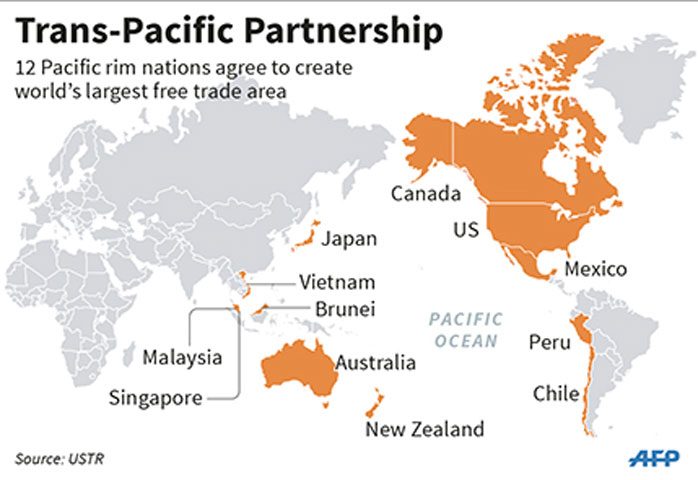
(Source: USTR)
The Obama administration just got one step closer to finalizing what could be the largest regional trade accord in history, as 12 nations came to an agreement Oct. 5 on the terms of the controversial Trans-Pacific Partnership.
Those involved account for roughly 40 percent of the world's gross domestic product: the U.S., Australia, Brunei, Chile, Canada, Japan, Malaysia, Mexico, New Zealand, Peru, Singapore and Vietnam. The pact would unite the countries into a web of rules-based commitments governing trans-Pacific commerce, liberalizing trade in nearly all goods and services.
"When more than 95 percent of our potential customers live outside our borders, we can't let countries like China write the rules of the global economy," President Barack Obama said in a statement. "We should write those rules, opening new markets to American products while setting high standards for protecting workers and preserving our environment."
Enhancing U.S. influence throughout Asia has been a key goal in Obama's foreign policy and economic agenda, and negotiations have already been five years in the making.
But it's been an uphill battle for the president from the start. Now that the participating countries have reached an agreement, it faces months of scrutiny in Congress. Most congressional Democrats have expressed disdain for the pact, leaving the president to seek allies among Republicans, who tend to be pro-trade, yet hesitate to contribute to his legacy.
Despite the enormity of the agreement and its significance to American labor, the text has not been made available to the public; what is known has been revealed through leaked documents. Yet the fast-track component, which received congressional approval in June, was arguably the deal's most controversial element, requiring Congress to vote on the accord without threatening to filibuster or amend the 30-chapter text.
In February, 35 faith-based coalitions and 31 Catholic leaders and theologians called on the president and Congress to cease negotiations, troubled by the lack of transparency and potential ramifications to the world's marginalized.
"If this is such a good deal for the American people and people across the globe, why couldn't we see it?" said Christopher Hale, executive director of Catholics in Alliance for the Common Good, which also fought fast-track authority earlier this year.
"Our biggest concern is the process itself," Hale said. "It really was due thorough consideration by the American people and by people across the globe, and to date there's been little. It really violates the spirit of Pope Francis' call for a government that includes everyone."
The White House stated that those involved in negotiations included advisory committees representing labor unions, environmental groups, faith organizations, public health advocates, consumer organizations, local and state officials, and farmers, ranchers and small businesses.
But nearly 600 corporate advisers, including Halliburton and Caterpillar, were also invited to the table, making a number of religious organizations suspicious about who will benefit from the secret agreement.
Gerry Lee, director of the Mary-knoll Office for Global Concerns, said that the negotiations "have been so carefully kept from public view and only shown to the corporations who are heavily involved in the treaty process that it's certainly logical to assume that the ultimate version of the treaty will heavily favor big pharma and transnational corporations over low-income and middle-class communities in the Americas and Asia."
The deal would phase out 18,000 individual foreign tariffs on American exports, including automobiles, machinery, information technology and consumer goods, chemicals and agricultural products, according to the Office of the U.S. Trade Representative. It would also open the Internet to the 12 nations (including communist Vietnam) and set standard rules for corporations' intellectual property, higher standards for labor conditions (such as requiring minimum wage and regulated working hours), and stronger environmental protections (such as laws against wildlife trafficking) — all enforceable under the deal's dispute-settlement mechanism.
"We don't take the view that trade can never be good," said Laura Peralta- Schulte, a lobbyist for trade issues within NETWORK, a national Catholic social justice lobby. "We need trade, but the rules of the road are critical and have to preference the common good — not special interests."
Though NETWORK will not take an official position on the Pacific accord until the text is available in full, Peralta-Schulte said its concern stems from its resemblance to the 1994 North American Free Trade Agreement between the U.S., Canada and Mexico. In their international work, NETWORK members witnessed firsthand that treaty's negative consequences for the poor and marginalized, she said.
The Peterson Institute for International Economics, however, estimates that this partnership could boost the world economy by $223 billion by 2023, though the impact would be most felt in developing countries rather than the U.S.
But whether or not the agreement contradicts Catholic social teaching, the three Catholic groups agreed, is what ultimately influences their stances.
"To reduce the TPP to an economic agreement misses the far-ranging effects it will have on the lives of people throughout the world," Hale said. "Let's be clear: It's not an economic agreement, it's a moral agreement. ... Legislation that doesn't prioritize the poor and excluded is bad legislation, so we want that to be the scoring card by which members of Congress measure it."
Peralta-Schulte, Hale and Lee listed a number of potential negative outcomes of the deal:
- Farmers in Latin America being forced to migrate if their products cannot compete with lowered international prices;
- Increased prices on pharmaceuticals, including generic medication;
- Limitations on energy policies combatting climate change, which mostly affects poorer countries;
- Currency manipulation, driving the value of the dollar down to increase exports while outsourcing jobs;
- A provision called investor-state dispute settlement, granting foreign corporations the political power to challenge U.S. laws in front of a small, private group of attorneys that answer to no country. Though not confirmed, leaked drafts show this provision to be a key part of the treaty.
Maryknoll's concern about the deal transcends its effects on the U.S. economy, as the religious order works on an international scale and sees ramifications from the urban slums of Asia and Africa to rural villages in South America. These people are on the "very edge of survival and are incredibly vulnerable to major economic decisions like the TPP," Lee said.
"You can't simply measure this bill on the effect it'll have on Americans," Hale added. " 'It's good for America so it's good for the world' is a naive assumption."
But The Economist, a weekly English newspaper, argued in its Oct. 10 issue that this deal is to the benefit of the marginalized. "The problem is not just cyclical: the ever-broader range of goods manufactured within China, among other structural changes, seems to have slowed trade growth permanently. This is worrying because trade remains the most reliable way for poor countries to become richer. TPP would undoubtedly help spur it."
Adversaries of the deal, however, turn to the encyclical "Laudato Si', on Care for Our Common Home," in which Francis called for a more inclusive economy: "There is a need to respect the rights of peoples and cultures, and ... constant and active involvement of local people from within their proper culture."
"This process has been just the total opposite," Lee said. "It's really part of the whole economic system that the pope is very clearly concerned about and condemning."
[Soli Salgado is an NCR Bertelsen intern. Her email address is ssalgado@ncronline.org.]


